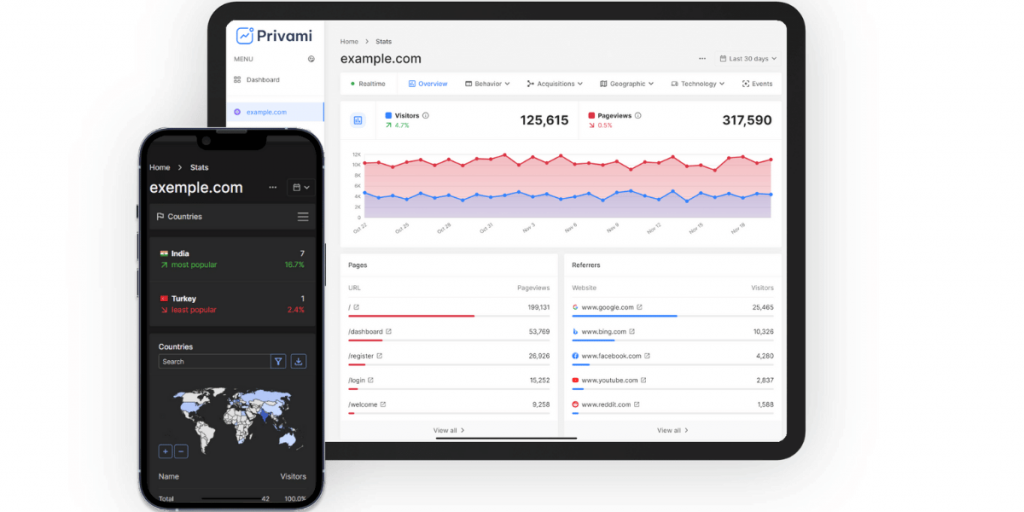
Can web analytics work without cookies?
Overview of cookieless web analytics
The shift towards a cookieless digital environment signifies a transformative change in the digital landscape. Historically, cookies have played a pivotal role in comprehending online user behavior, enabling businesses to personalize experiences and optimize digital strategies effectively. Their significance in accumulating user data has been fundamental to the evolution of digital marketing.
However, mounting concerns regarding privacy and data protection are steering us towards a cookieless future. This shift is not merely a technological trend but a response to the increasing awareness and demand for privacy from users and regulatory bodies alike. Major browsers phasing out third-party cookies are not just adapting to this change; they are actively shaping a new paradigm in web data analysis.
This transition is reshaping the fundamentals of how businesses approach web analytics. It signifies a departure from the long-standing reliance on cookies, moving towards more innovative and privacy-centric methods of data collection and analysis. The change is profound, affecting how companies strategize, gather, and interpret web data.
The importance of cookieless analytics in modern marketing
The shift to cookieless analytics is a crucial step towards sustainable digital marketing. This new era necessitates a reimagined approach to gathering insights. Businesses are now challenged to discover new methodologies that respect user privacy while still providing the valuable data required for effective decision-making.

In a cookieless landscape, methods such as first-party data collection, contextual targeting, and privacy-centric tracking technologies take center stage. These approaches are not just alternatives to traditional cookies, they represent a new ethos in web analytics, one that places user consent and transparency at its core.
This paradigm shift is not solely about compliance with regulations like GDPR and CCPA, it’s about earning and maintaining user trust. Businesses that can adapt to this new landscape, leveraging innovative technologies and methodologies, will be the ones that thrive. They will be regarded as pioneers in a new era of digital marketing, setting standards for privacy, user respect, and data integrity.
Cookie-based tracking versus cookieless
Cookie-based tracking
Cookies are small data blocks generated by a web server when a user browses a website. They remember user preferences, login details, and track user activity on the site. Cookies can be either first-party, created by the website the user is visiting, or third-party, created by a domain other than the one the user is visiting. While first-party cookies are generally considered less invasive, third-party cookies have been criticized for tracking user activity across the web without their knowledge or consent. Key aspects of cookie-based tracking include:
- User authentication: Maintaining user sessions on websites.
- Personalization: Storing user preferences and settings for a customized experience.
- Analytics: Collecting data on user behavior for optimizing site content and marketing strategies.
- Advertising: Delivering targeted ads based on user’s browsing history and interests.
- Cross-device tracking: Tracking users across multiple devices for a unified view of online activities.
Cookieless tracking
Cookieless tracking, an alternative method, does not rely on first-party or third-party cookies. It has emerged with the rise in cookie blockers and deletion options. This method uses techniques like fingerprinting, device graphs, contextual advertising, and first-party data. Differences between cookie-based and cookieless tracking include:
- Privacy-friendly: Designed to be more privacy-centric, cookieless tracking respects user privacy by reducing the need to store personal data on their devices.
- Reduced reliance on cookies: It often utilizes methods like device fingerprinting, first-party data, or anonymized identifiers to track user interactions.
- User-centric: Cookieless tracking focuses on user consent and control, aligning with transparency and user-centric data handling.
- Improved accuracy: Cookieless tracking, with its alternative methods, provides more accurate and comprehensive user behavior data.
Cookieless tracking benefits include enhanced privacy, cross-device tracking, improved accuracy, and compliance readiness with data protection regulations like GDPR and CCPA. Implementing cookieless tracking involves defining tracking objectives, choosing the right technology, establishing a data governance framework, ensuring user consent and transparency, and regular testing and optimization
Adapting to a cookieless future
Adapting to a cookieless future presents both challenges and opportunities. It necessitates that businesses embrace new technologies and methodologies, rethinking how they engage with their audience and collect data. The focus lies in building direct relationships with audiences, harnessing first-party data, and utilizing advanced technologies such as machine learning and AI to analyze data patterns in a privacy-conscious manner.
Server-side tracking emerges as a pivotal technology in this new era, offering a more privacy-compliant approach to understanding user behavior. This approach differs significantly from traditional client-side cookie tracking, providing enhanced data privacy and accuracy.
This adaptation also entails a cultural and strategic shift. It requires businesses to redefine their values to align with the new expectations of their users. Companies that can successfully navigate this shift, prioritizing user privacy and transparent data practices, will not only comply with emerging regulations but also forge stronger, more trusting relationships with their customers.
Google Analytics 4: A cookieless approach marred by GDPR compliance issues

In the dynamic landscape of digital analytics, the introduction of Google Analytics 4 (GA4) has marked a significant development. Launched in response to the increasing demand for privacy and a shift towards a less intrusive, consent-based web tracking system, GA4 appeared to be a step forward in the cookieless era. However, despite its advancements, GA4‘s approach has raised critical concerns regarding GDPR compliance and data privacy.
As of mid-2022, GA4 had not achieved full GDPR compliance. This shortfall primarily stemmed from its inability to adequately protect EU citizens’ data against US surveillance laws, directly breaching GDPR requirements. Despite Google‘s efforts to introduce privacy-focused features like data deletion mechanisms and IP anonymization, the company struggled with EU-US data protection regulations, especially after the invalidation of the Privacy Shield framework in 2020.
Google’s attempts to prepare GA4 for GDPR provisions fell short in crucial areas such as user data storage, transfer, and security. The strained relationship between Google and EU regulators, exacerbated by decisions from the Court of Justice of the European Union, highlighted the challenges GA4 faced in aligning with GDPR. While GA4 boasted features like shorter data retention periods and user-requested data extractions, these improvements did not completely bridge the gap to full GDPR compliance.
Despite some progress, GA4 still harbored significant limitations in its privacy controls. These shortcomings positioned GA4 in a precarious situation concerning GDPR compliance. This non-compliance not only affected Google but also presented legal risks to websites using GA4 for tracking or analyzing European visitors. The tool’s failure to fully adhere to GDPR standards exposed these sites to potential legal challenges.
A core issue with GA4‘s GDPR compliance was the unresolved matter of non-consensual EU-US data transfer. New privacy controls in GA4 failed to address this fundamental concern, leaving a significant gap in aligning with GDPR’s stringent privacy and data protection requirements. Consequently, Google Analytics’ non-compliance could potentially lead to legal persecution for websites tracking European visitors, as they may inadvertently be using a tool that is not fully compliant with GDPR regulations.
While GA4 represented a leap towards adapting to a cookieless digital environment, it is crucial to acknowledge its current limitations regarding GDPR compliance and data privacy. As the digital world evolves, so must the tools we use, ensuring they not only meet the technological demands but also align with the ethical and legal standards of user data protection and privacy.
Privacy-centric analytics alternatives
When considering alternatives to Google Analytics 4, particularly in light of GDPR compliance and privacy concerns, several options come to mind. Each alternative offers unique features and advantages that align more closely with privacy regulations and user consent models. Let’s briefly explore a few of them, with a special focus on Privami as a standout solution.
Plausible Analytics Plausible offers a lightweight and privacy-focused analytics tool. It doesn’t use cookies and fully complies with GDPR, making it a great choice for businesses concerned about user privacy. Its simple and clear interface is a bonus for those seeking straightforward analytics.
Fathom Analytics Fathom is known for its strong stance on privacy and simplicity. It is a cookieless analytics platform, offering real-time data without compromising user privacy. Fathom is GDPR and ePrivacy compliant, emphasizing user anonymity and data protection.
Privami Analytics Privami stands out as a highly viable alternative, especially for those seeking robust privacy features and GDPR compliance. Privami’s analytics platform is designed with privacy at its core, ensuring that user data is treated with the utmost respect and in full compliance with GDPR standards. It offers a suite of tools that allow for detailed analytics without infringing on user privacy. Key features include:
- No cookies required: Privami operates without relying on cookies, thereby sidestepping the issues associated with cookie-based tracking.
- GDPR compliant: Designed specifically to align with GDPR regulations, Privami ensures that data collection and processing are carried out with full legal compliance.
- User privacy focus: The platform prioritizes user privacy, making it a trustworthy choice for businesses and their users.
- Comprehensive analytics: Despite its strong focus on privacy, Privami does not compromise on the depth and usefulness of the analytics it provides.

Privami stands out for its commitment to GDPR compliance and its no-cookie approach to web analytics. For businesses and website owners looking to navigate the cookieless future while adhering to strict privacy standards, Privami presents a compelling option.
The journey towards a cookieless future is a path of adaptation and innovation. Businesses that can successfully navigate this shift, balancing technological advancements with ethical considerations of privacy and data integrity, will not only comply with emerging regulations but also build stronger, more trusting relationships with their customers. As the digital world continues to evolve, so too must our approaches to data collection and analysis, ensuring they meet both the technological needs and the ethical standards of our time.

